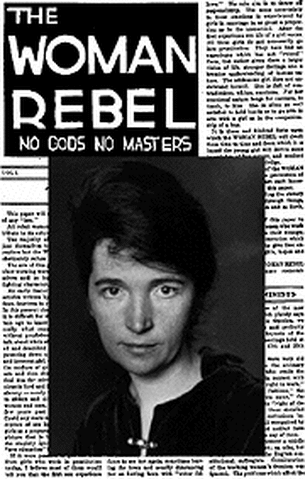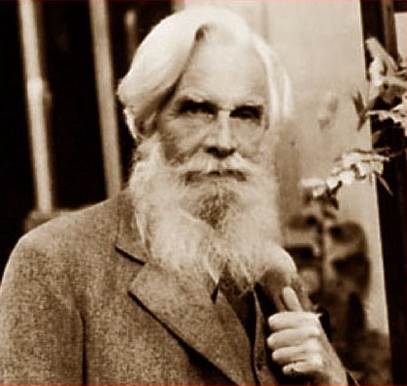* If you follow US politics, you might have heard of Planned
Parenthood – the nationwide women’s health agency that is now under huge attack
by the Republican Party, militant pro-life activists, Fox News, the Christian
Right and assorted other wingnuts.
 What you may not know is that Planned Parenthood can trace it’s
lineage back to a remarkable Irish-American woman, a suffragette and early
advocate for women’s health rights and family planning.
What you may not know is that Planned Parenthood can trace it’s
lineage back to a remarkable Irish-American woman, a suffragette and early
advocate for women’s health rights and family planning.
She was the redoubtable Margaret Sanger, the daughter of two Irish
emigrants. Her father Michael Hennessey Higgins, left Ireland
as a child, served as a drummer-boy in the Union Army fighting the Civil War at
15 and grew up to be a radical free-thinker, socialist and “Walk Away”
Catholic.
She was born Margaret Hennessy Higgins. And 99 years ago, on
October 25th, 1916, she was arrested for operating a birth control
clinic in Brooklyn, New York (America’s first). Convicted and sent to jail for
a month, she was totally unrepentant and went on to devote the rest of her life
to women’s health.
Today - at least two candidates for the US Presidency have added their names to a letter - signed by 25 Republican Party law-makers - calling for a bust of this great woman to be removed from America's National Portrait Gallery's "Struggle for Justice" exhibit.
They label her a racist and a "baby murderer". But you could argue that what they really hate about Margaret Sanger is that she stood up against ignorance and religious dogma, to fight for the rights of poor women. And helped found what would go on to be Planned Parenthood.
Sanger's legacy has come under attack from the extremists who want to deny women birth control and access to affordable health care today.
For her supporters, those who want to destroy her name and erase her legacy today are the direct descendants of those politicians and law-makers who put Margaret in prison in 1916, to silence her, to intimidate her, to punish her for daring to stand up for the health rights of ordinary women.
The woman born Margaret Hennessey Higgins refused to be silenced back then, those who honour her work and her life can show the same strength today.
For her supporters, those who want to destroy her name and erase her legacy today are the direct descendants of those politicians and law-makers who put Margaret in prison in 1916, to silence her, to intimidate her, to punish her for daring to stand up for the health rights of ordinary women.
The woman born Margaret Hennessey Higgins refused to be silenced back then, those who honour her work and her life can show the same strength today.
* Born in 1879 in New York, Margaret was one of 11 surviving children to her Irish catholic parents (both had fled to North America as children during the Great Famine). Her mother underwent 22 pregnancies and died (a devout catholic) aged 49.
 |
| Sanger's Father - Irish-born Michael Hennessey Higgins |
Her father Michael was a remarkable man, a boy-soldier with the Union Army in the Civil War, he had tried to become a doctor before having to settle for being a stone-mason (his speciality was angels for fancy tombs). Michael Hennessey rejected the Catholic Church, became a radical, a free-thinker and encouraged his children, including Margaret, to think for themselves, work for social justice and reject dogma and ignorance.
Margaret became a visiting Nurse, working with some of the poorest families on the Lower East Side in New York, in 1911. She also threw herself into radical politics, campaigning for social justice, for voting rights for women and for access to health care.
It was whilst working amongst the poor that she came across cases of women who were facing severe health problems due to multiple births, and also women who died because of back-street abortions.
Margaret had already, in 1914, launched a regular newsletter, titled That Women Rebel - No Gods, No Masters - promoting birth control and women's rights.
She wanted to provide information for women - but also to provoke a challenge to the federal anti-obscenity law that banned any promotion or mention of contraception.
In her work day life as a nurse, it was after one particularly harrowing case in 1915 that she resolved to import contraceptives from France and distribute them through the first family planning clinic in the US. She set it up in 1916 and was arrested after a month. A book she published on the issue of family planning was also banned and led to another prosecution.
Sanger had witnessed a young women she knew personally die from the affects of an attempted self-induced abortion.
Later on, she wrote of that night; "I threw my nursing bag in the corner and announced ... that I would never take another case until I had made it possible for working women in America to have the knowledge to control birth".
A few years earlier, she had written a series of extremely frank and informative sex columns for a popular left-wing magazine, titled "What Every Woman Should Know".
Sanger (she had married and had kids herself several years earlier) refused to be silenced, refused to be barred from what she saw as her life's work.
She did dabble in the fashionable (at the time) theories of population control and the quack science of Eugenics, the belief (then very widespread in intellectual and scientific circles) that you could "breed" superior human beings through selection based on race, IQ, physical characteristics etc. This is the stick that is now being used to attack her legacy, the implication being that Sanger wanted mass sterilisation and the elimination of "inferior" races.
Eugenics - viewed from a modern perspective - is gruesome, quack science. It was widely championed at the time by scientists, politicians, intellectuals (GB Shaw was a big proponent) and even religious leaders such as the Catholic Archbishop of New York, Irishman Patrick J Hayes, who hosted an international conference on Eugenics in NY in 1921. But it was used by Hitler and the Nazis to justify the mass sterilisation or euthanasia of people they considered sub-humans,
Everything that we know about Margaret Sanger - her humanity, her devotion to the health and well-being of all women, her promotion of science and knowledge, her rejection of crushing dogma and the many hypocrisies and shibboleths which were designed to keep women ignorant and powerless, tell us her belief in Eugenics was, at worst, as mistaken and misguided with her as it was with the many other prominent figures who briefly embraced its dubious promise.
Eugenics - viewed from a modern perspective - is gruesome, quack science. It was widely championed at the time by scientists, politicians, intellectuals (GB Shaw was a big proponent) and even religious leaders such as the Catholic Archbishop of New York, Irishman Patrick J Hayes, who hosted an international conference on Eugenics in NY in 1921. But it was used by Hitler and the Nazis to justify the mass sterilisation or euthanasia of people they considered sub-humans,
Everything that we know about Margaret Sanger - her humanity, her devotion to the health and well-being of all women, her promotion of science and knowledge, her rejection of crushing dogma and the many hypocrisies and shibboleths which were designed to keep women ignorant and powerless, tell us her belief in Eugenics was, at worst, as mistaken and misguided with her as it was with the many other prominent figures who briefly embraced its dubious promise.
Sanger lived a very long life, worked with trade unions, on worker's rights, on social justice, on health provision for the poor and for the rights of women.
She was instrumental in changing laws, in changing attitudes and changing the lives of millions of women for the better, whether that was in getting the right to vote or opening the way towards affordable, available contraception.
Her life was far, far too long and eventful to go into here, but there is much to read online.
Margaret Sanger was by any measure a remarkable woman. If anybody deserves to be remembered in their country's National Portrait Gallery, especially in a section titled "The Struggle For Justice", it is her.
**** Hey - Thanks For Reading****

No comments:
Post a Comment
Hi - I welcome comments - even if they don't agree with what I say or simply don't like it. But I always try to treat people with respect and I would appreciate the same in return. There's no point in calling me names or getting into personal abuse because there are only a handful of people in the world whose opinion of me I respect and - no offense - you are unlikely to be one of them.
Thanks!